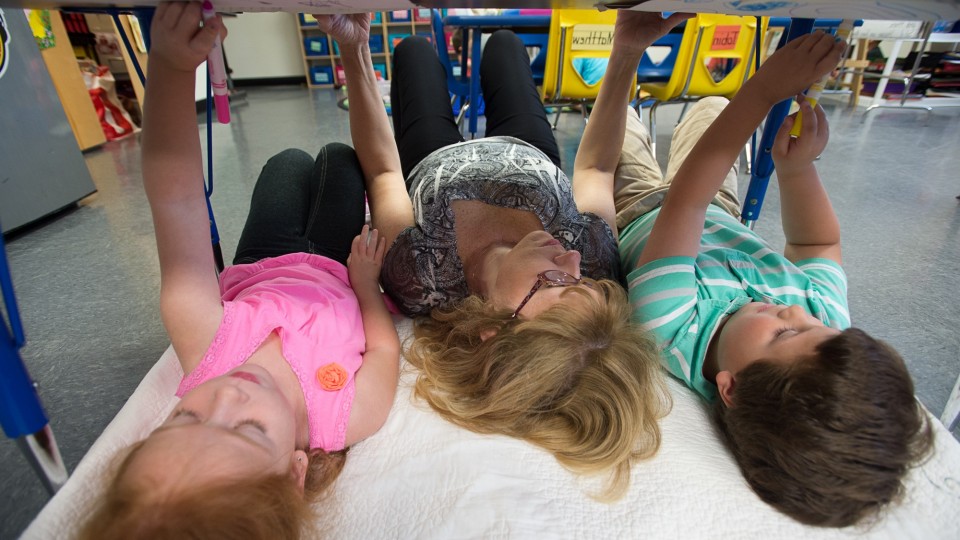Can a teacher get a hand?
- June 3, 2016
- / Shannon Nickinson
- / education

Luke Graham and Finley Krantz do an astronaut writing assignment with teacher Lisa Ray in VPK class at the Gonzalez United Methodist Child Enrichment Center in Cantonment, Fl. Wednesday, April 29, 2015. (Michael Spooneybarger/ Studer Community Institute)
School’s out for summer, but put this little mosquito in your thinking cap before the heat gets to you.
AdvancED, in the Spring edition of its newsletter, includes a column on the importance of coaching for early childhood teachers.
Work in that field is being done right here in Northwest Florida.
Now in its sixth year, a research project by the Florida State University’s Florida Center for Reading Research has focused on how effective extra help can be for preschool children who are behind in the skills they will need to become fluent readers in elementary school.
After testing some 19 strategies to help preschoolers improve their reading comprehension, the FSU team added a layer to the project this year.
In previous years, FSU-hired interventionists did the work with children. Jeanine L. Clancy, senior research associate, said beginning this year classroom teachers were trained to implement the intervention.
They are testing two levels of professional development. All the teachers got a half-day, face-to-face training session on the interventions, which are to take place four times a week over an eight-week period.
Then teachers were randomly assigned into two groups. One group gets feedback weekly from a coach who either observes the teacher in person or watches a recording of lesson and gives feedback by email.
The other group doesn’t have the weekly coaching.
Clancy said this spring that the team will use to the data to see how much professional development it is likely to take for a classroom teacher to get the same results.
The 2013 study AdvancED cites, “Investing in Our Future: The Evidence Base on Preschool Education,” notes that research shows that coaching has benefits for teachers and students, be it directly in the classroom or through web-based video clips.
Giving preschool teachers the tools, techniques and support they need to become stronger at their job is another piece of the early education puzzle.
One that sadly has been left to chance or goodwill in the past.
Preschool is the gateway to a child’s educational life, but historically it has been stereotyped as glorified baby-sitting, a view that is as demeaning to the people who work in those jobs as it is short-sighted.
The educational world expects more of kindergartners than it did a generation ago. And yet, the State of Florida’s funding for its voluntary prekindergarten program is less per child now than it was when the program began in 2005.
Phyllis Pooley of the Office of Economic Development and Engagement at the University of West Florida, says that according to the Florida Department of Economic Opportunity, the median hourly wage in the Pensacola metro area is $9.27 for childcare workers.
That works out to $19,281 a year. At the state level, it’s $9.55 an hour — $19,864 a year.
What does that say about how much we value our children — and the people who are teaching them at what science tells us is the most critical period of brain development in their lives?
That, friends, isn’t family values.
That is a crying shame.
 CivicCon launches with a look at good growth in cities
CivicCon launches with a look at good growth in cities
 Building stronger brains one baby, one parent at a time
Building stronger brains one baby, one parent at a time
 SCI debuts commercial on Early Learning City
SCI debuts commercial on Early Learning City
 Entrecon: World class speakers and an opportunity to sharpen skills
Entrecon: World class speakers and an opportunity to sharpen skills
 PYP Quality of Life survey 2017
PYP Quality of Life survey 2017
 EntreCon Pensacola 2016: A look back
EntreCon Pensacola 2016: A look back
 Leadership tip: getting better employee takeaways
Leadership tip: getting better employee takeaways
 Leadership tip: be interested instead of interesting
Leadership tip: be interested instead of interesting
 Leadership tip: delivering difficult messages
Leadership tip: delivering difficult messages
 Brain Bags boost Arc, Early Childhood Court programs
Brain Bags boost Arc, Early Childhood Court programs